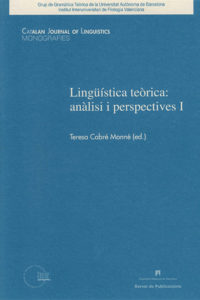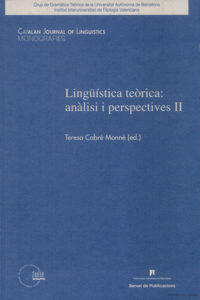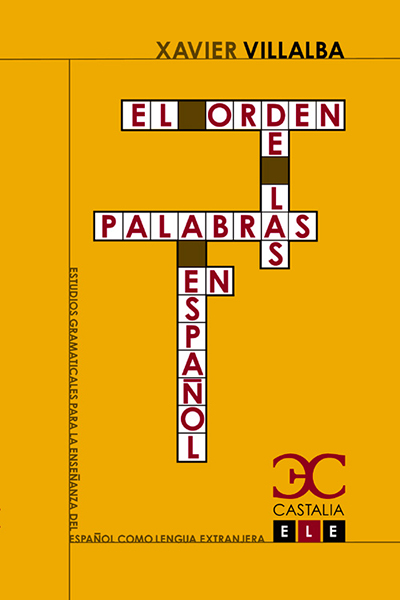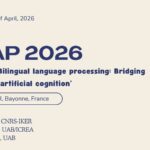13 abril, 2021
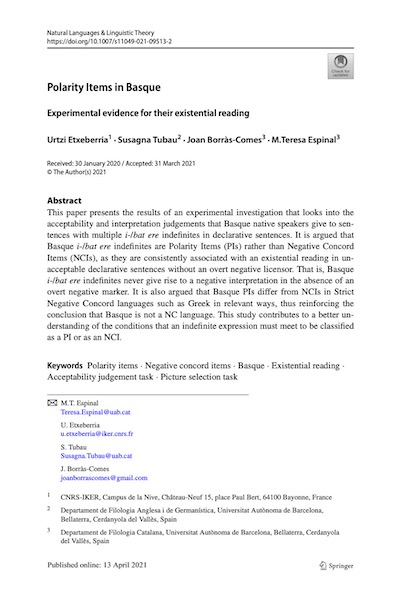
Autors:
Urtzi Etxeberria, Susagna Tubau, Joan Borràs-Comes & M.Teresa Espinal
Títol:
Polarity Items in BasqueEditorial: Natural Language & Linguistic Theory, Springer
Data de publicació: 13 d'abril del 2021
This paper presents the results of an experimental investigation that looks into the acceptability and interpretation judgements that Basque native speakers give to sentences with multiple i-/bat ere indefinites in declarative sentences. It is argued that Basque i-/bat ere indefinites are Polarity Items (PIs) rather than Negative Concord Items (NCIs), as they are consistently associated with an existential reading in unacceptable declarative sentences without an overt negative licensor. That is, Basque i-/bat ere indefinites never give rise to a negative interpretation in the absence of an overt negative marker. It is also argued that Basque PIs differ from NCIs in Strict Negative Concord languages such as Greek in relevant ways, thus reinforcing the conclusion that Basque is not a NC language. This study contributes to a better understanding of the conditions that an indefinite expression must meet to be classified as a PI or as an NCI.
4 setembre, 2023
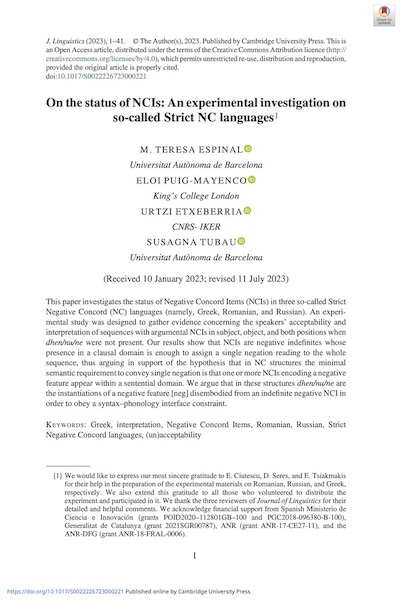
Autors:
M.Teresa Espinal, Eloi Puig-Mayenco, Urtzi Etxeberria i Susagna Tubau
Títol:
On the status of NCIs: An experimental investigation on so-called Strict NC languagesEditorial: Journal of Linguistics (Cambridge University Press)
Data de publicació: Juliol del 2023
Pàgines: 41 Més informacióThis paper investigates the status of Negative Concord Items (NCIs) in three so-called Strict Negative Concord (NC) languages (namely, Greek, Romanian, and Russian). An experimental study was designed to gather evidence concerning the speakers’ acceptability and interpretation of sequences with argumental NCIs in subject, object, and both positions when dhen/nu/ne were not present. Our results show that NCIs are negative indefinites whose presence in a clausal domain is enough to assign a single negation reading to the whole sequence, thus arguing in support of the hypothesis that in NC structures the minimal semantic requirement to convey single negation is that one or more NCIs encoding a negative feature appear within a sentential domain. We argue that in these structures dhen/nu/ne are the instantiations of a negative feature [neg] disembodied from an indefinite negative NCI in order to obey a syntax–phonology interface constraint.
5 abril, 2024
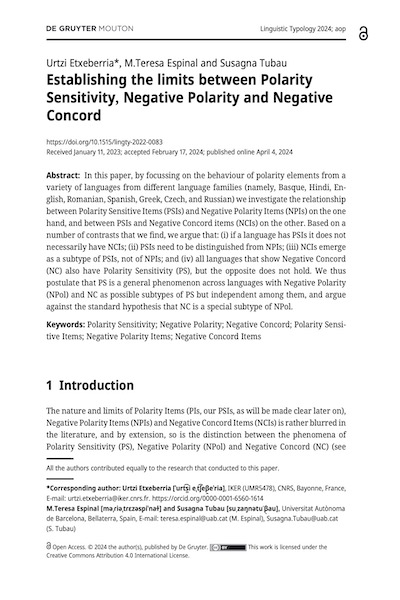
Autors:
Urtzi Etxeberria, M.Teresa Espinal & Susagna Tubau
Títol:
Establishing the limits between Polarity Sensitivity, Negative Polarity and Negative ConcordEditorial: Linguistic Typology (de Gruyter)
Data de publicació: 4 d'abril del 2024
Text completIn this paper, by focussing on the behaviour of polarity elements from a variety of languages from different language families (namely, Basque, Hindi, English, Romanian, Spanish, Greek, Czech, and Russian) we investigate the relationship between Polarity Sensitive Items (PSIs) and Negative Polarity Items (NPIs) on the one hand, and between PSIs and Negative Concord items (NCIs) on the other. Based on a number of contrasts that we find, we argue that: (i) if a language has PSIs it does not necessarily have NCIs; (ii) PSIs need to be distinguished from NPIs; (iii) NCIs emerge as a subtype of PSIs, not of NPIs; and (iv) all languages that show Negative Concord (NC) also have Polarity Sensitivity (PS), but the opposite does not hold. We thus postulate that PS is a general phenomenon across languages with Negative Polarity (NPol) and NC as possible subtypes of PS but independent among them, and argue against the standard hypothesis that NC is a special subtype of NPol.
14 maig, 2004
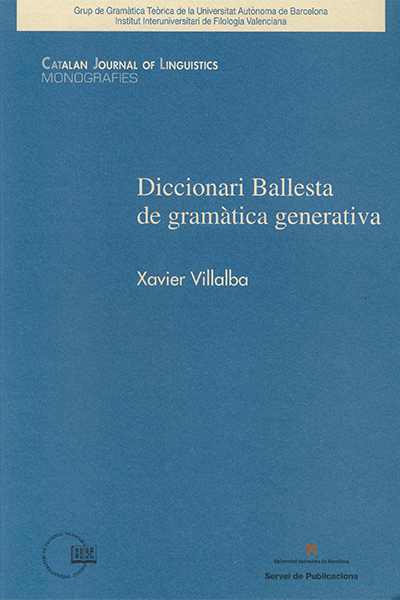
Autors:
Xavier Villalba
Títol:
Diccionari Ballesta de gramàtica generativaEditorial: Universitat Autònoma de Barcelona, Servei de Publicacions
Col·lecció: Monografies Catalan Journal of Linguistics #1Data de publicació: 2004
Pàgines: 207ISBN13: 8449023513
El Diccionari Ballesta de gramàtic generativa es una versió profundament actualitzada i ampliada del clàssic Diccionari de gramàtica generativo-transformacional de Joan-Manual Ballesta, que pretén donar cabuda a l'ampli cabal terminològic encunyat pels últims models de la gramàtica generativa durant la dècada del noranta, com ara el programa minimista, la teoria de l'optimitat o la morfologia distribuïda. A més de contribuir a la normalització teminològica del camp, aquesta obra constitueix una eina de consulta utilíssima per a lingüistes, estuidants de lingüística, traductors especialitzats i per a qualsevol persona interessada en l'evolució del corrent lingüístic més important de la segona meitat del segle XX: la gramàtica generativa.
Títols de la col·lecció / Also in this series:





